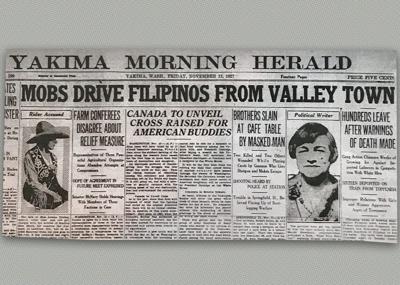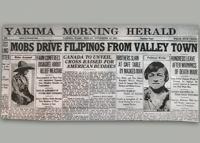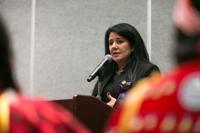Japanese were not the only Yakima Valley residents forced from the Yakima Valley in the 20th century.
Ninety years ago Filipinos who immigrated here after the U.S. annexed their country after the Spanish-American War, were subjected to mob violence and forced removal.
Like other immigrants, Filipinos came to the Pacific Northwest in the 1920s when jobs were more plentiful than in their homeland. Others came because they married American soldiers stationed in the Philippines during and after the Spanish-American War.
While there were immigration quotas for Chinese and Japanese immigrants, Filipinos were exempt due to their status as American nationals. While they did not possess full citizenship, Filipinos were free to come into the country and travel where they wanted in search of work.
Many of them came to the Yakima Valley to work in the orchards and fields, and eventually established a community. But they found themselves the target of animosity by whites who leveled the same charges at them that have been laid against other people of color: Taking jobs away from Americans, committing crimes and seducing white women.
The anti-Filipino sentiments reached a boiling point in November 1927 when mobs set out to rid the Toppenish area of Filipinos.
They were spurred by claims Filipino men were accosting white women on the streets of Toppenish, as the Yakima Morning Herald reported.
On Nov. 8, an estimated 30 men stormed the home of Ellis Peregrino, a Filipino married to a white woman living near Toppenish. The mob demanded that farm workers at the couple’s home leave the county by midnight. Others stormed Filipino boarding houses in the area, beating young men and ordering them to leave the Valley.
The next day, 150 men in 30 cars rode into Toppenish, rounding up groups of Filipinos and ordering them to leave the area or be killed. At least 16 were put on a train for the west side of the state, while others were told that they would be hanged if they didn’t leave town by the next day.
The violence ended when sheriff’s deputies stopped an armed mob intent on killing Filipinos in Wapato. The few remaining Filipinos were put in jail in Sunnyside for their own protection.
Sheriff L.D. Luce claimed the mob members were just “young men desirous of excitement,” while Toppenish Police Chief William Mann accused the Filipinos of seducing women with their flashy clothes and musical talents.
But not everyone in the area was sympathetic to the mob.
The Toppenish Commercial Club passed a resolution condemning the mob action, while county prosecutors tried mob leaders, who were sentenced to 10 days in jail.
A month later, state Sen. D.V. Morthland, a Yakima Republican, spoke at the Filipino community’s Rizal Day event Dec. 30, according to the Yakima Daily Republic. The holiday commemorates the 1896 execution of Jose Rizal, who started the Philippine revolution against Spain.
In the 1950s, the Lower Valley’s Filipinos built the Filipino Community Hall in Wapato, considered the oldest Filipino community hall in the western United States.
• It Happened Here is a weekly history column by Yakima Herald-Republic reporter Donald W. Meyers. Reach him at 509-577-7748 or dmeyers@yakimaherald.com. Follow him on Twitter at twitter.com/donaldwmeyers.









(0) comments
Comments are now closed on this article.
Comments can only be made on article within the first 3 days of publication.